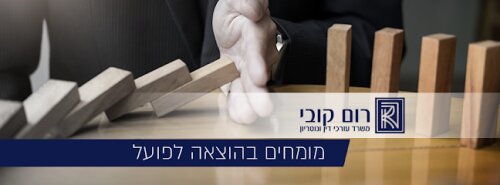Best Bankruptcy & Debt Lawyers in Ramat Gan
Share your needs with us, get contacted by law firms.
Free. Takes 2 min.
List of the best lawyers in Ramat Gan, Israel
About Bankruptcy & Debt Law in Ramat Gan, Israel
Bankruptcy and debt law is a significant area of legal practice in Ramat Gan, Israel, as it impacts individuals, families, and businesses facing financial hardship. The legal framework governing bankruptcy and debt in Ramat Gan follows national Israeli legislation, primarily the Insolvency and Rehabilitation Law, 5778-2018. This law regulates how debts are settled, how assets are distributed among creditors, and how individuals or companies may get a financial fresh start through bankruptcy, also known in Hebrew as "peshitot regel."
Residents and business owners in Ramat Gan who are struggling to meet their financial obligations may find themselves navigating complex legal procedures, whether they are seeking debt relief, negotiating with creditors, or facing potential liquidation of assets. Understanding your rights and obligations under the law is essential to protect your interests and make informed decisions.
Why You May Need a Lawyer
Many people in Ramat Gan encounter situations where the help of an experienced bankruptcy and debt lawyer can be invaluable. Some common scenarios include:
- You are unable to pay your debts and creditors are taking legal action against you.
- You are being harassed by debt collectors or receiving court summons related to unpaid debts.
- You are considering filing for bankruptcy and need to understand the process and your eligibility.
- You own a business in financial distress and want to explore restructuring or liquidation options.
- You are threatened with foreclosure on your home or repossession of assets.
- You want to negotiate settlements or repayment plans with creditors.
- You have received a restraining order (tzav ikuv yetzi'a) preventing you from leaving Israel due to debt.
Legal advice can help prevent costly mistakes, protect your assets, and ensure your financial rights are upheld under Israeli law.
Local Laws Overview
In Ramat Gan, bankruptcy and debt matters are governed by Israeli national laws, applied locally by the courts and various official bodies. The key legislation is the Insolvency and Rehabilitation Law, 5778-2018. Here are important aspects of the local legal landscape:
- Types of Proceedings: Individuals and companies can file for insolvency proceedings, which may result in debt restructuring or liquidation, depending on the case.
- Debt Relief: Individuals who meet certain criteria may be eligible for full or partial debt discharge after following a supervised repayment plan.
- Assets & Exemptions: The law outlines which assets can be protected from creditors and which may be liquidated to satisfy debts.
- Creditor Rights: Creditors must follow legal procedures to recover debts and have certain rights to object to proposed repayment or discharge of debt.
- Rehabilitation Focus: The system is designed to help honest debtors rehabilitate and re-enter normal economic life while balancing creditor interests.
- Local Courts: Insolvency and bankruptcy cases in Ramat Gan are typically handled by the Tel Aviv District Court or the Magistrate Court, depending on the size and scope of the case.
- Trustees: Court-appointed trustees manage most insolvency and bankruptcy cases, overseeing asset management, debt repayment, and resolution of disputes.
Frequently Asked Questions
What is the difference between bankruptcy and insolvency in Israel?
Insolvency is a broader financial state where a person or business cannot meet their debt obligations. Bankruptcy is a formal, legal process involving court proceedings that typically applies to individuals. Both are covered under the Israeli Insolvency and Rehabilitation Law.
Can individuals and businesses both file for bankruptcy in Ramat Gan?
Yes. Both individuals and businesses can seek relief through insolvency or bankruptcy proceedings in Ramat Gan, subject to specific eligibility requirements and procedures outlined in the law.
What are the first steps if I am unable to pay my debts?
You should gather all relevant financial documents, assess your debts and assets, and consult a lawyer or financial advisor. Early advice can help you determine the best course of action and whether formal insolvency proceedings are necessary.
Will I lose all my property if I declare bankruptcy?
Not necessarily. Certain essential assets are protected under the law, such as basic household items and necessary work tools. However, other assets may be liquidated by a court-appointed trustee to repay creditors.
How long does the bankruptcy process take in Israel?
The length varies by case complexity, amount of debt, and cooperation with the process. For individuals, after following the required repayment plan, a court may grant a discharge order within a few years.
Are there alternatives to bankruptcy?
Yes. Options include negotiating repayment plans directly with creditors, mediation, or court-approved settlement agreements. A lawyer can help you explore these alternatives.
Will bankruptcy affect my credit rating?
Yes. Filing for bankruptcy or an insolvency proceeding negatively impacts your credit rating and may affect your ability to obtain loans or credit in the future.
Are wages or bank accounts protected from creditors?
Some portion of your wages and social benefits may be exempt from seizure. However, creditors or court orders can freeze bank accounts in certain circumstances. Legal advice is essential for understanding your specific protections.
Can bankruptcy stop legal actions or enforcement proceedings?
Generally, once insolvency or bankruptcy proceedings begin, a legal freeze is placed on most enforcement actions and court proceedings against the debtor, offering temporary protection.
How can I find a qualified bankruptcy lawyer in Ramat Gan?
Look for licensed attorneys with demonstrated experience in bankruptcy and financial law, preferably members of the Israeli Bar Association. Personal recommendations or referrals from local legal aid organizations can also help.
Additional Resources
If you are seeking help with bankruptcy and debt matters in Ramat Gan, consider reaching out to the following resources:
- Israeli Insolvency and Rehabilitation Service (IIRS) - This government agency manages insolvency proceedings and offers updated information for debtors and creditors.
- Tel Aviv District Court - Handles most bankruptcy and insolvency cases for the Ramat Gan area.
- Legal Aid Bureau (Lishkat Siyua Mishpati) - Provides free or subsidized legal assistance to eligible individuals facing debt and bankruptcy issues.
- Israeli Bar Association - Directory of licensed lawyers, including those specializing in bankruptcy and debt law.
- Social Services Departments - Many local authorities, including Ramat Gan, offer support for families and individuals facing severe financial distress.
Next Steps
If you are facing financial difficulties or have received communication from creditors, acting quickly is important. Here are suggested next steps:
- Collect all documents related to your debts, income, assets, and correspondence with creditors.
- Consider reaching out to a qualified bankruptcy and debt lawyer in Ramat Gan for a consultation.
- Explore available government or nonprofit support services if you cannot afford private legal counsel.
- Discuss all available options with your lawyer, including possible alternatives to bankruptcy and the consequences of each.
- Follow legal advice closely and respond promptly to any court or official notices.
Taking these steps can help ensure your rights are protected and give you the best chance for financial recovery and a fresh start.
Lawzana helps you find the best lawyers and law firms in Ramat Gan through a curated and pre-screened list of qualified legal professionals. Our platform offers rankings and detailed profiles of attorneys and law firms, allowing you to compare based on practice areas, including Bankruptcy & Debt, experience, and client feedback.
Each profile includes a description of the firm's areas of practice, client reviews, team members and partners, year of establishment, spoken languages, office locations, contact information, social media presence, and any published articles or resources. Most firms on our platform speak English and are experienced in both local and international legal matters.
Get a quote from top-rated law firms in Ramat Gan, Israel — quickly, securely, and without unnecessary hassle.
Disclaimer:
The information provided on this page is for general informational purposes only and does not constitute legal advice. While we strive to ensure the accuracy and relevance of the content, legal information may change over time, and interpretations of the law can vary. You should always consult with a qualified legal professional for advice specific to your situation.
We disclaim all liability for actions taken or not taken based on the content of this page. If you believe any information is incorrect or outdated, please contact us, and we will review and update it where appropriate.
Browse bankruptcy & debt law firms by service in Ramat Gan, Israel
Ramat Gan, Israel Attorneys in related practice areas.









